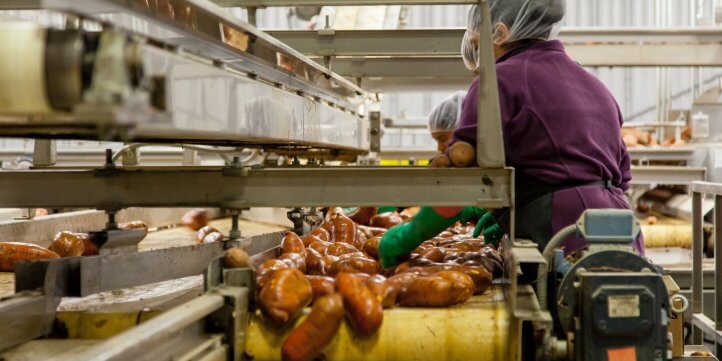Why are we Seeing Outbreaks Within the Food Manufacturing Sector?

Nomad Foods, Pladis, Bakkavor, Arla Foods, Coupar Angus, Greencore, Fyffes, 2 Sisters, Mission Foods, Cranswick, Farmer’s Boy… this is just a very small list of the many UK food manufacturing centres that have been hit by localised outbreaks of COVID-19.
However, this trend isn’t just being witnessed here, with Germany, France, Spain, and the United States all reporting notably high rates of transmission across the industry.
Why?
The obvious answer would be that the SARS-CoV-2 virus could be transmitted through raw ingredients, or through food packaging. However, there is no solid evidence that this is the case. Instead, it is believed that the prominence of COVID-19 in food manufacturing plants is largely due to environment, and treatment of employees.
There are three primary reasons for outbreaks within the sector:
1. Cold and Damp
Food manufacturing plants are often very cold and damp environments due to the fresh, raw ingredients that are handled on the premises. While COVID-19 is still not yet fully understood, previous research into other members of the coronavirus family suggest that outbreaks are more likely between December and April, suggesting that the cooler, wetter weather during the period provides a better platform for transmission.
2. Production Noise
The UK Government states that ‘people should avoid singing, shouting, and raising voices’ in places of worship due to ‘the potential for increased risk of transmission from droplets’. Food manufacturing plants are typically very noisy environments due to machinery, which means that workers may need to talk loudly to communicate. This is why it is now recommended that face coverings are worn while in all indoor settings.
3. Employee Treatment
Workers union Unite has been very vocal about food manufacturing facilities during the pandemic, stating that ‘there is a direct correlation between the treatment of migrant staff and the spread of disease in such environments’. The union reports that 65% of migrant workers have attended work while feeling unwell due to worries about job loss, suggesting that food employees may be spreading SARS-CoV-2 within the workplace.
Minimising Risk
The Government has outlined specific steps that food manufacturing plants should take to reduce the risk of transmission within their facilities. This includes undertaking a risk assessment and process review, cleaning machinery and surfaces regularly, training staff, and ‘continuing to ensure that the use of PEE is as set out in your Food Safety Management System, and in line with your current Health & Safety at Work policies’.
It’s important to remember that SARS-CoV-2 isn’t ‘clever’; it doesn’t target specific industries. However, it does spread easily in environments that facilitate transmission. The most effective way to reduce the risk of these localised outbreaks is to protect workers; to provide necessary PPE, to maintain social distancing where possible, and to care for employees, taking a flexible approach in order to support those presenting symptoms.





